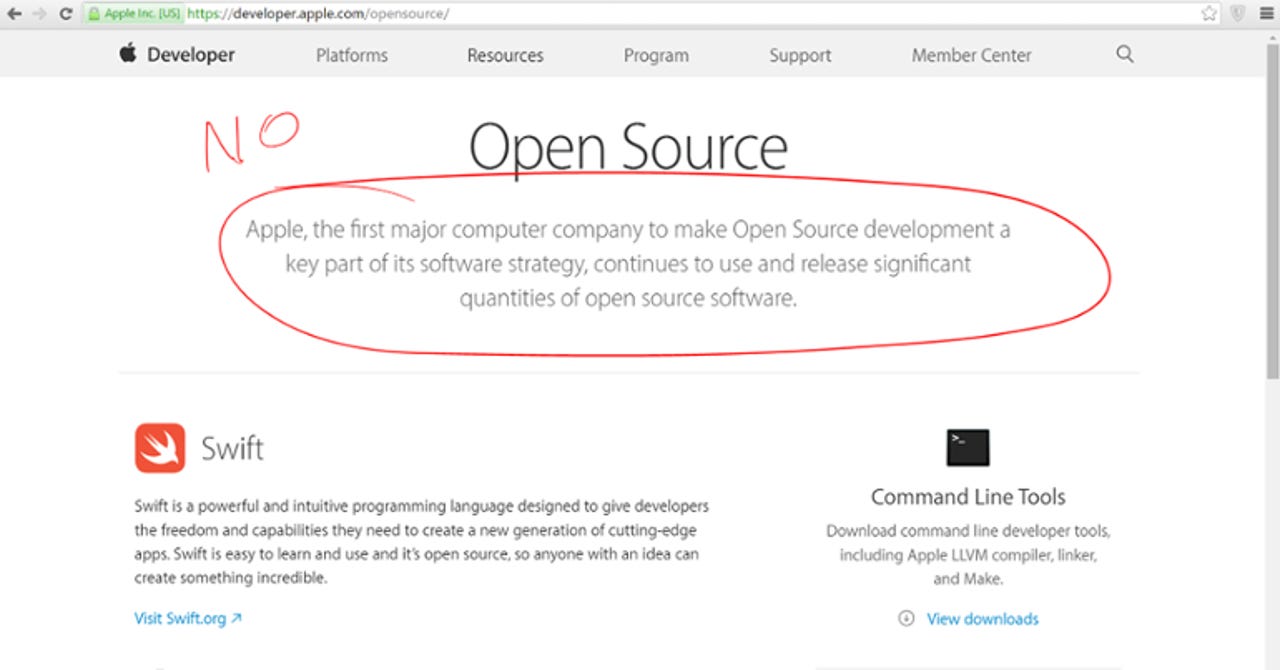Was Apple the first major open-source company? Not even close

Many open-source developers were happy when Apple announced that it was open-sourcing its popular Swift language. They weren't so happy, however, when Apple claimed it was also "the first major computer company to make Open Source a key part of its strategy."

Ah, I don't think so.
Many older open-source programmers think, with reason, that's nonsense.
True, Apple has used open-source software for years, but that's not the same thing as making open-source development "a key part of its strategy." It would be more correct to say that Apple was the first major company to take advantage of open source.
Historically, Apple grows its software from open-source seeds, but the company's developers rarely contribute much code back.
The prime example of this is the Mac operating system. OS X is based on Darwin, a BSD Unix. Darwin started in 1996 with Steve Jobs' NeXTStep. Along the way to its official first release Cheetah in 2001, Mac OS X picked up a Mach 3.0-based microkernel that incorporated some of FreeBSD.
Instead of encouraging others to work on Darwin, which by itself isn't a working operating system, Apple dumped chunks of code weeks or months after each version of Mac OS X is released. For example, Apple released 10.11 "El Capitan", on September 30, 2015, but the latest OS X source code still isn't available.
This is not how open-source development works.
Gallery: The 20 most significant events in Linux's 20-year history
The result is that the Apple-sponsored group that tried to turn Darwin into a working operating system, OpenDarwin, gave up trying in 2006. Its leaders wrote that the project had failed because of a lack of "availability of sources, interaction with Apple representatives, difficulty building and tracking sources" and the resulting lack of interest from its community.
Today, PureDarwin is still trying to get it to work. But, with over a dozen show-stoppers, you won't see it anytime soon... or perhaps ever.
Other projects, such as WebKit, the web browser engine, are true open-source projects, but Apple has done little to support them. For instance, Google forked WebKit with Blink in 2013, and, without Google's developers, WebKit's development pace fell by 60 percent.
Enterprise Software
Still other Apple open-source programs, such as CUPS, the Unix network printing system, came from outside the company. In CUPS's case, it was bought by Apple in 2007. At least with CUPS the project is still active and open.
What you get when you put it all together is that Apple is much more of an open-source user than a leader. So, who was the first "major" company to support open source? Well, you can argue it was Red Hat, founded in 1994; German Linux power SUSE, which got its start in 1996; or Corel, which in 1999 unsuccessfully released the first desktop Linux for the mainstream. But if you want to talk about really big companies supporting open-source I think the winner has to be IBM supporting Linux with a billion bucks in 2000. Even if you consider Mac OS X an open-source success, IBM beat Apple to the punch.
Apple, seeing which way the wind was blowing, made a rare public relations retreat. Instead of claiming to be the first open-source leader, it now reads: "'Open-source software is at the heart of Apple platforms and developer tools, and Apple continues to contribute and release significant quantities of open-source code."
That's still an exaggeration, but it's not the whopper that Apple had claimed earlier.
Indeed, Apple, far more so than Microsoft, which is now an open-source believer, is the most proprietary computer company still in business today. Some day Apple may be a real open-source leader, but that day is still far off.
Related Stories: